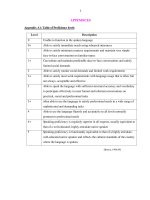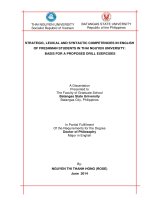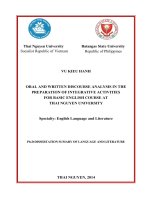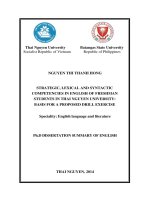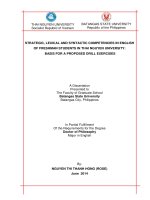Learning guides in speaking english in in class and out of class activities for vietnamese freshman students in the thai nguyen university system
Bạn đang xem bản rút gọn của tài liệu. Xem và tải ngay bản đầy đủ của tài liệu tại đây (4.7 MB, 194 trang )
i
THAI NGUYEN UNIVERSITY
Socialist Republic of Vietnam
BATANGAS STATE UNIVERSITY
Republic of the Philippines
LEARNING GUIDES IN SPEAKING ENGLISH IN IN-CLASS AND
OUT-OF-CLASS ACTIVITIES FOR VIETNAMESE FRESHMAN
STUDENTS IN THE THAI NGUYEN UNIVERSITY SYSTEM
A Dissertation Presented to
The Faculty of Graduate School
Batangas State University
Batangas City, Philippines
In partial Fulfillment of the
Requirements for the Degree of
Doctor of Philosophy
Major in English
By
Van Thi Quynh Hoa (Flower)
Số hóa bởi Trung tâm Học liệu – ĐHTN
i
THAI NGUYEN UNIVERSITY
Socialist Republic of Vietnam
BATANGAS STATE UNIVERSITY
Republic of the Philippines
ABSTRACT
Title: Learning Guides in Speaking English in In-class and
Out-of-class Activities for Freshman Students in the Thai Nguyen
University System.
Author
: Van Thi Quynh Hoa (Flower)
Course
: Doctor of Philosophy
Major
: English
Year
: 2015
Adviser
: Dr. Amada Banaag
Summary
This study was undertaken to determine the level of English
language performance and the extent of participation of students in inclass and out-of-class activities of the freshman students in the Thai
Nguyen University system to propose learning guides in speaking
English both for in-class and out-of-class activities.
The respondents of the study were four hundred (400) students
also from these universities who served as respondents.
Specially, the study sought to answer the following questions:
Số hóa bởi Trung tâm Học liệu – ĐHTN
ii
THAI NGUYEN UNIVERSITY
Socialist Republic of Vietnam
BATANGAS STATE UNIVERSITY
Republic of the Philippines
1. What is the level of English language performance of the
students? 2. What is the extent of participation of students in in-class
activities which require speaking in English? 2.1 listening; 2.2 speaking;
2.3 reading and 2.4 writing? 3. To what extent do students‘ engage in
the following out-of-class activities? 3.1 contests; 3.2 clubs; 3.3 sports;
3.4 games and 3.5 entertainment? 4. Is there any significant difference
between the extent of participation in in-class and that of out-of-class
activities? 5. In which among in-class and out-of-class activities do
teachers find communication barriers? 6. What learning guide in
speaking English both for in in-class and out-of-class activities may be
proposed?
The hypothesis of the study is no significant difference between
the extent of participation in in-class and out-of-class activities
In order to analyze the data gathered: Weighted mean was used
to determine the levels of language performance of the students and the
extent of participation of using English in in-class and out-of-class
activities.
Dependent sample t-test was utilized the significant difference
between the extent of participation of student in in-class activities and
out–of–class activities.
The study was revealed that the level of English language
performance of freshman students of Thai Nguyen University System
Số hóa bởi Trung tâm Học liệu – ĐHTN
iii
THAI NGUYEN UNIVERSITY
Socialist Republic of Vietnam
BATANGAS STATE UNIVERSITY
Republic of the Philippines
was on the average only. Additionally, the extent of participation of
using English in in-class activities was high on reading and speaking;
there was a moderate extent of participation on entertainment as a form
of out-of-class activities; the performance of the students in using
English in in-class activities is better than in out-of-class activities;
writing was deliberate as communication barriers in terms of in-class
activities while joining clubs was noticed on out-of-class activities and a
proposed learning guide was formulated to enhance students English
speaking.
With the result of the study, the following recommendations are
given. First, the faculty may use verbal and non-verbal cues to
encourage participation. Second, English Lecturers may undergo
training and must be equipped with modern teaching methodologies so
as to increase the effectiveness of English language teaching. Third,
students should be encouraged to watch and listen to English news like
CNN, BBC, DD news etc… and English serials/movies in TV/Radio so
as to learn right pronunciation of various words and develop their
listening skill. Fourth, Students should be given enough practice to face
interviews by conducting mock interviews in schools and colleges so as
to build their confidence in spoken communication. Dramatization
technique can be used to improve spoken English skill. Fifth, students
should be encouraged to write letters to their friends in English.
Số hóa bởi Trung tâm Học liệu – ĐHTN
iv
THAI NGUYEN UNIVERSITY
Socialist Republic of Vietnam
BATANGAS STATE UNIVERSITY
Republic of the Philippines
Motivate them to use complete English words to communicate using
SMS by mobiles phones outside the college hours so as to improve
written communication skill of the students and a proposed learning
guide may be used to enhance students‘ ability to speak in English.
Số hóa bởi Trung tâm Học liệu – ĐHTN
v
BATANGAS STATE UNIVERSITY
Republic of the Philippines
THAI NGUYEN UNIVERSITY
Socialist Republic of Vietnam
ACKNOWLEDGMENT
The writer extends her sincerest thanks and appreciations to those people
who in one way or another have helped make this piece of work a reality.
Dr. Dang Kim Vui, President of Thai Nguyen University, for establishing
the international cooperation relationship between BSU and TNU.
Dr. Hoang Bich Thao, Director for International Training Center,
for his assistance and for supporting the researcher a chance to gain
professional growth through completion of this study.
The Panel of Examiners, for their honest and meaningful
comments and recommendation to go on with this research work.
Dr. Amada Banaag, her adviser and mentor, who drained all her effort
and her best during the entire preparation and revision of this study.
To the Rectors of the University, for his permission to conduct
the research at Thai Nguyen Universities.
To the students who served as her respondents for their
assistance and collaboration in providing information necessary for the
completion of the study.
To her husband and her children, for inspiring her fulfill her dream.
To her ever dearest friends, and relatives who in one way or
another, gave her encouragement and remarkable support.
V.T.Q.H
Số hóa bởi Trung tâm Học liệu – ĐHTN
vi
THAI NGUYEN UNIVERSITY
Socialist Republic of Vietnam
BATANGAS STATE UNIVERSITY
Republic of the Philippines
DEDICATION
With pride and honor,
This piece of work is lovingly dedicated
To her beloved parents, her loving husband
and to her children
V.T.Q.H
Số hóa bởi Trung tâm Học liệu – ĐHTN
vii
THAI NGUYEN UNIVERSITY
Socialist Republic of Vietnam
BATANGAS STATE UNIVERSITY
Republic of the Philippines
TABLE OF CONTENTS
Page
ABSTRACT .............................................................................................. i
ACKNOWLEDGMENT............................................................................ v
DEDICATION ......................................................................................... vi
TABLE OF CONTENTS ........................................................................ vii
LIST OF FIGURES ................................................................................ xii
CHAPTER
I. THE PROBLEM .................................................................... 1
Introduction ................................................................................ 1
Statement of the Problem ...................................................... 5
Scope, Delimitation and Limitation ..................................... 6
Significance of the Study ....................................................... 7
II. REVIEW OF LITERATURE .................................................. i
Conceptual Literature ............................................................. 8
Research Literature ............................................................... 39
Several studies were reviewed by the researcher in
order to come up with a strong foundation for the
present study........................................................................... 39
Synthesis .................................................................................. 43
Theoretical Framework ....................................................... 47
Conceptual Framework ........................................................ 48
Hypothesis of the Study ....................................................... 62
Số hóa bởi Trung tâm Học liệu – ĐHTN
viii
THAI NGUYEN UNIVERSITY
Socialist Republic of Vietnam
BATANGAS STATE UNIVERSITY
Republic of the Philippines
Definition of Terms ................................................................ 62
III. RESEARCH METHOD AND PROCEDURE .................... 64
Research Environment ......................................................... 64
Research Design.................................................................... 66
Subjects of the Study ............................................................ 67
Data Gathering Instruments ................................................ 69
Data Gathering Procedure .................................................. 71
Statistical Treatment of Data .............................................. 73
IV. PRESENTATION, ANALYSIS AND INTERPRETATION
OF DATA .................................................................................. i
V. SUMMARY, CONCLUSIONS AND RECOMMENDATIONS
.................................................................................................. i
Summary ................................................................................ 143
Findings .................................................................................. 145
Conclusions ........................................................................... 148
Recommendations ............................................................... 149
BIBLIOGRAPHY
APPENDICES
A. Questionnaire on In-Class and Out-Of-Class
Activities of Vietnamese Freshman Students in the
Thai Nguyen University System ............................... 167
B. Test on English Language Performance of
Vietnamese Freshman Students .............................. 173
Số hóa bởi Trung tâm Học liệu – ĐHTN
ix
THAI NGUYEN UNIVERSITY
Socialist Republic of Vietnam
BATANGAS STATE UNIVERSITY
Republic of the Philippines
C. Validation Letter of the Questionnaire for Students
............................................................................................ 180
D. Letters of Request to the Head of the Colleges .... 181
E. Documents for Validation of Questionnaires and
Test in ............................................................................... 185
F. Photographs of the Study Sites .......................... 186
G. Photographs of the Approval Test Administration of
the Head of Colleges ................................................
H. Photographs of the Student Respondents ................
CURRICULUM VITAE
Số hóa bởi Trung tâm Học liệu – ĐHTN
x
THAI NGUYEN UNIVERSITY
Socialist Republic of Vietnam
BATANGAS STATE UNIVERSITY
Republic of the Philippines
LIST OF TABLES
Table
Title
Page
1. Distribution of Student Samples by Colleges............................................68
2. Level of English Language Performance of the Students .......................75
3. Extent of Participation of Students in In-Class Activities in Terms of
Listening ...............................................................................................78
4. Extent of Participation of Students in In-Class Activities in Terms of
Speaking ..............................................................................................81
5. Extent of Participation of Students in In-Class Activities in Terms of
Reading ................................................................................................84
6. Extent of Participation of Students in In-Class Activities in Terms of
Writing ..................................................................................................86
7. Summary Table on the Extent of Participation of Students in In-Class
Activities ...............................................................................................89
8. Extent of Participation of Students in Out-Of-Class Activities in Terms of
Contests ...............................................................................................90
9. Extent of Participation of Students in Out-Of-Class Activities in Terms of
Clubs ....................................................................................................92
10. Extent of Participation of Students in Out-Of-Class Activities in Terms of
Sports ...................................................................................................94
11. Extent of Participation of Students in Out-Of-Class Activities in Terms of
Games ..................................................................................................96
Số hóa bởi Trung tâm Học liệu – ĐHTN
xi
THAI NGUYEN UNIVERSITY
Socialist Republic of Vietnam
BATANGAS STATE UNIVERSITY
Republic of the Philippines
12 .Extent of Participation of Students in Out-Of-Class Activities in Terms of
Entertainment ......................................................................................99
13. Extent of Participation of Students in Out-Of-Class Activities ............ 101
14.Difference Between the Extent of Participation in In-class and Out-ofclass Activities................................................................................... 103
15. Difficulty Encountered in In-class Activities in Terms of Listening...... 106
16. Difficulty Encountered in In-class Activities in terms of Speaking ...... 108
17. Difficulty Encountered in In-class Activities in terms of Reading ........ 109
18. Difficulty Encountered in In-class Activities in terms of Writing .......... 111
19. Summary Table on the Difficulty Encountered in In-class Activities .. 111
20. Difficulty Encountered in Out-Of-Class Activities in Terms of Contest ....113
21. Difficulty Encountered in Out-Of-Class Activities in Terms of Clubs .... 114
22. Difficulty Encountered in Out-Of-Class Activities in Terms of Sports. 116
23. Difficulty Encountered in Out-Of-Class Activities in Terms of Games ...117
24. Difficulty Encountered in Out-Of-Class Activities in Terms of
Entertainment ................................................................................... 119
25. Summary Table on the Difficulty Encountered in Out-Class Activities
........................................................................................................... 120
Số hóa bởi Trung tâm Học liệu – ĐHTN
xii
THAI NGUYEN UNIVERSITY
Socialist Republic of Vietnam
BATANGAS STATE UNIVERSITY
Republic of the Philippines
LIST OF FIGURES
Figure
1.
Title
Page
English language performance, extent of participation
in in-class and out-of-class activities towards proposed
learning guides ………………………………………………….50
Số hóa bởi Trung tâm Học liệu – ĐHTN
1
THAI NGUYEN UNIVERSITY
Socialist Republic of Vietnam
BATANGAS STATE UNIVERSITY
Republic of the Philippines
CHAPTER I
THE PROBLEM
Introduction
English language is a global language which is used for
communication with native-speakers and non-native-speakers in the
world, especially in the education sector, all university students need it
in their studies in order to search information and obtain knowledge.
With this, a lot of the universities throughout the world need to include
English language as one of their educational tool requirements as it is
the central language of communication in all sectors of society.
Due to requirements including increasing foreign companies,
expanding international trading relations and the growing tourist industry
and number of students undertaking overseas study, English is now
taught not only in general education levels and university levels but also
in most foreign language centers. This means that the needs and
requirements of English language learners have changed. In the past,
students only wanted to be good at grammar and gain as much
vocabulary as possible so that they could read, understand and even
write in English. Nowadays, English is needed for daily communication
and employment.
Số hóa bởi Trung tâm Học liệu – ĐHTN
2
THAI NGUYEN UNIVERSITY
Socialist Republic of Vietnam
BATANGAS STATE UNIVERSITY
Republic of the Philippines
Students who enter university lacking the English competency
necessary to pursue their studies effectively can suffer anxiety,
frustration, de-motivation and an inability to engage with the learning
process. Professional courses that involve work placements, such as
education, pharmacy and nursing, can be particularly problematic and
result in high levels of student stress and even expulsion if they are
unable to meet the communicative demands involved. Students facing
these kinds of situations may ultimately opt to withdraw from their
studies, a decision which can carry with it the stigma of ―failure within
their families and/or cultures and thus represent a source of real
trauma. Equally, those for whom language competence is not an issue
can and do become frustrated as they see their own progress as being
hampered by students who, they may feel, should not be enrolled in
degree programs if they do not have the language skills needed to cope
and keep up. Such feelings intensify when, as tends to happen,
students cluster together for course tasks and activities or receive
―special attention in the form of credit-bearing English courses their
native-speaker peers sometimes perceive as soft options. For their part,
lecturers can feel awkward and confounded by students who struggle
with the language, sometimes opting to ignore them and/or simply
directing them to learning advisers in the hope that they will be able to
― address the concern.
Số hóa bởi Trung tâm Học liệu – ĐHTN
3
THAI NGUYEN UNIVERSITY
Socialist Republic of Vietnam
BATANGAS STATE UNIVERSITY
Republic of the Philippines
In Thai Nguyen University, students are facing two problems
when they learn English. First, university students continue to make
some basic errors in pronunciation, spelling, morphology and syntax.
Second, they are unable to express themselves confidently and
efficiently either when dealing with 'academic topics' or 'common
everyday topics'. The students' major difficulty arises from the fact that
they cannot use English correctly and appropriately in and out the
classroom when required to do so. This means that the difficulty is
related to the students' deficiencies in communicative competence and
self-expression.
The university can enhance student learning by using its existing
resources more effectively. The key tasks in transcending the artificial
boundaries between in-class and out-of-class learning activities are to
break down the barriers between various units (e.g., academic
departments, administrative services, student affairs) and to create
situations in which students examine the connections between their
studies and life outside the classroom and to apply what they are
learning. Key steps are for universities to address the importance of outof-class experiences explicitly in the institution's mission, develop a
common understanding of the desired outcomes of undergraduate
education and the combination of institutional conditions and student
Số hóa bởi Trung tâm Học liệu – ĐHTN
4
THAI NGUYEN UNIVERSITY
Socialist Republic of Vietnam
BATANGAS STATE UNIVERSITY
Republic of the Philippines
experiences most likely to produce these outcomes, assess regularly
the impact of in-class as well as out-of-class environments on students.
The researcher still believes that something can still be done to
upgrade English language performance in in-class and out-of-class
activities if only more meaningful measures are taken with focused
attention. What is needed are not always surveys to diagnose the
defect, but rather take a micro inquiry on the matter, and come up with
measures that are adoptable to a particular element.
This is the stance that the researcher takes in conducting a study
on in-class and out-of-class activities of Vietnamese freshman students
in the Thai Nguyen University system in the hope of proposing learning
guides for both activities.
Số hóa bởi Trung tâm Học liệu – ĐHTN
5
BATANGAS STATE UNIVERSITY
Republic of the Philippines
THAI NGUYEN UNIVERSITY
Socialist Republic of Vietnam
Statement of the Problem
This study dealt with the Learning Guides in speaking English in
in-class and out-of-class activities for freshman students in the Thai
Nguyen University system.
Specifically, it sought to answer the following questions:
1. What is the level of English language performance of
the students?
2. What is the extent of participation of students in in-class
activities which require speaking in English?
2.1
listening;
2.2
speaking;
2.3
reading and
2.4
writing?
3. To what extent do students‘ engage in the following outof-class activities?
3.1
contests;
3.2
clubs;
3.3
sports;
3.4
games and
3.5
entertainment?
4. Is there any significant difference between the extent of
participation
in
in-class
and
that
of
out-of-class
activities?
Số hóa bởi Trung tâm Học liệu – ĐHTN
6
THAI NGUYEN UNIVERSITY
Socialist Republic of Vietnam
BATANGAS STATE UNIVERSITY
Republic of the Philippines
5. In which among in-class and out-of-class activities do
teachers find communication barriers?
6. What learning guide in speaking English both for inclass and out-of-class activities may be proposed?
Scope, Delimitation and Limitation
The study focused on learning guides in speaking English in inclass and out-of-class activities for Vietnamese freshman students in
the Thai Nguyen University system during the first semester of
academic year 2013-2014. The subjects of the study were limited to the
freshman students of Thai Nguyen University who were from the
College of Agriculture and Forestry; College of Education; College of
Information
Technology;
College
of
Sciences;
and
College
of
Economics and Business Administration.
The level of English language performance of the first year
college students was also evaluated by the college English test. It also
included the extent of participation of students in in-class activities and
out-of-class activities.
For in-class activities, it was limited only to listening, speaking,
reading and writing; while for out-of-class activities its is limited only to
contests, clubs, sports, games and entertainment.
Số hóa bởi Trung tâm Học liệu – ĐHTN
7
THAI NGUYEN UNIVERSITY
Socialist Republic of Vietnam
BATANGAS STATE UNIVERSITY
Republic of the Philippines
Significance of the Study
The study is deemed significant for its contributions to the
following groups of individuals.
University administrators of Thai Nguyen University. They will
benefit from the study as it will be their basis for curriculum
development and academic planning.
College English teachers. They will be provided with a rationale
and understanding as to why the students language performance is
such and would instill in them a deep appreciation of the remedial
strategies that will be designed.
College students of English. They will benefit from the study
especially in areas that concern measures to take in order to improve
English language performance.
To the researcher herself. As an English teacher, she is always
confronted
with
the
challenge
of
improving
English
language
performance of her students, therefore hopes the findings of the study
will help her become a better teacher.
To the future researchers. This study may serve as the
springboard of other researchers along the same concern.
Số hóa bởi Trung tâm Học liệu – ĐHTN
8
THAI NGUYEN UNIVERSITY
Socialist Republic of Vietnam
BATANGAS STATE UNIVERSITY
Republic of the Philippines
CHAPTER II
REVIEW OF LITERATURE
This chapter presents the conceptual and research literature related
to the present study. It also includes the synthesis, theoretical framework,
conceptual framework, hypothesis, and the definition of terms.
Conceptual Literature
This section contains the concepts that helped the researcher in
conceptualizing the present study. It includes English language
competencies,
in-class
activities,
extra-curricular
activities
and
instructional materials development.
English Learning Competencies. Competence is a term used in
linguistic theory, especially in generative grammar, to refer to person‘s
knowledge of his language, the system of rules which a language user
has mastered so that it would be possible for that user to be able to
produce and understand an indefinite number of sentences and
recognize grammatical mistakes and ambiguities (Wia‘am, 2003).
Chomsky's idea of competence as knowledge of language apart
from its use was criticized by Hymes (1972), who countered that not
only does competence refer to the individual's, knowledge of the forms
Số hóa bởi Trung tâm Học liệu – ĐHTN
9
THAI NGUYEN UNIVERSITY
Socialist Republic of Vietnam
BATANGAS STATE UNIVERSITY
Republic of the Philippines
and structures of language, but competence also extends to how the
individual uses language in actual social situations.
Competencies are developed through the learning process
(Sonnentag, Niessen, & Ohly, 2004), which involves acquiring
knowledge, skills and attitudes (Illeris, 2004). Learning may be defined
as a relatively lasting change in a person‘s capacity or behavior that is
transferable to new situations. It constitutes the process through which
the competency is developed while the expression of competencies
represents a manifestation of what the person learned.
Language competence is a term which includes the linguistics or
grammatical
competence,
discourse
competence,
sociolinguistics
competence and what might be called as textual competence.
Language competence refers to the knowledge of a language, cognitive
aspect in learning a language, and of course the ability to use that
language to produce meaningful production and language performance.
Competence is used to describe the learner s capacity to produce
a language. Students' competencies show that perceptions and
judgments of students about their own learning abilities, skills, or
competencies,
affect
their
academic
roles,
performances,
and
proficiencies particularly in learning foreign language in the classrooms.
Among the factors influencing foreign language learning, the
element of individual differences in perceived competence is
Số hóa bởi Trung tâm Học liệu – ĐHTN
10
BATANGAS STATE UNIVERSITY
Republic of the Philippines
THAI NGUYEN UNIVERSITY
Socialist Republic of Vietnam
paramount. Perceived competence is one's belief that he/she has the
skills and qualifications to do things well or it refers to the requisite
qualities in a specific situation to achieve specified tasks (Ormrod,
2006). For students, competency is a belief that they have the
academic capabilities to reach the required levels in foreign language
courses (Matsushima & Shiomi, 2003 ).
Mary Siew-Lian and Wong (2005) also provided the support for
the claim that a significant positive association existed between
students'
perception
about
competence
and
language
learning
strategies. Interview findings also revealed that using a number of
language learning strategies are often influenced by high self efficacy
and perceived competence that may impede their level of anxiety when
learning foreign language.
Language competence is divided into two main groups;
organizational
competence
dealing
with
morphology,
syntax,
vocabulary, cohesion and organization; and pragmatic competence
consisting
in
knowledge
of
relationships
between
speaker's
utterances and intentions, appropriateness, speech acts, language
functions and sociolinguistic competence. Strategic competence is an
ability to interconnect organizational and pragmatic components in an
efficient way.
Số hóa bởi Trung tâm Học liệu – ĐHTN
11
THAI NGUYEN UNIVERSITY
Socialist Republic of Vietnam
BATANGAS STATE UNIVERSITY
Republic of the Philippines
The target of having language competence is to be able in
producing the correct utterance, meaningful spoken language, and wellperformance language structure. Concerning English is a worldwide
used international language, especially as a foreign language in
countries, good English competence from learning activities, of course,
is aimed to be used as one of the communication medium bridges the
cross cultural people whose English is not as their native language.
Learning English as a foreign language is not merely simple learning
the vocabulary, structure or the grammar only, however, more than just
cognitive intelligence.
Additionally, it must be a very fatal mistake in some countries
where English is taught in school in order the students has good English
competence for passing the English exam and doing such English text
exercise and ignoring other skills which explore the performance of
English as a language. The conventional practical English teaching as a
foreign language which focuses on the cognitive aspect and
emphasizes the reading skill is still widely implemented, giving the proof
that grammar translation method is still existing.
If the reality tells that English competence becomes the main goal
of English teaching and learning with lack of special attention of English
performance, in this term is specified for speaking skills, it would
approximate the language theory refers to the structural view (Jack C.
Số hóa bởi Trung tâm Học liệu – ĐHTN
12
THAI NGUYEN UNIVERSITY
Socialist Republic of Vietnam
BATANGAS STATE UNIVERSITY
Republic of the Philippines
Richards, and Theodore S. Rodgers, 2002) that language is a system of
structurally related element of coding of meaning.
Language competence should be developed through classroom
activities which focus on meaningful uses of the language and on
language in context. Tasks will be chosen based on the needs, interests
and experiences of students. The vocabulary, grammatical structures,
text forms and social conventions necessary to carry out this task will be
taught, practiced and assessed as students are involved in various aspects
of the task itself, not in isolation.
However, language competence can also be achieved through
advanced writing skills which are an important aspect of academic
performance as well as of subsequent work-related performance.
Conversely, American students rarely attain advanced scores on
assessments of writing skills (National Assessment of Educational
Progress, 2002). In order to achieve higher levels of writing
performance, the working memory demands of writing processes should
be reduced so that executive attention is free to coordinate interactions
among them. This can in theory be achieved through deliberate practice
that trains writers to develop executive control through repeated
opportunities to write and through timely and relevant feedback.
Automated essay scoring software may offer a way to alleviate the
intensive grading demands placed on instructors and, thereby,
Số hóa bởi Trung tâm Học liệu – ĐHTN


